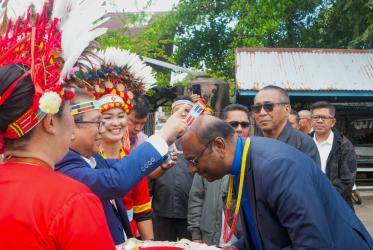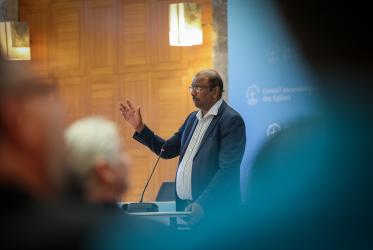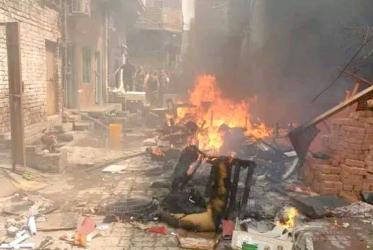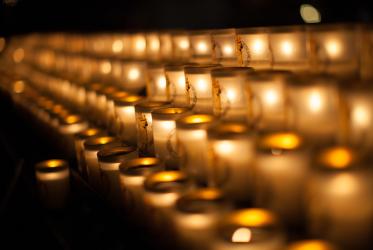Press release issued at the conclusion of the visit to Indonesia, 27 January - 3 February 1999.
Following a visit to Indonesia, a joint World Council of Churches (WCC)/Christian Conference of Asia (CCA) team has called on the Indonesian government urgently to identify and bring to justice those responsible for the burning and destruction of places of worship, as well as communal violence involving Christians and Muslims, and members of the ethnic Chinese minority.
During the visit, which took place 27 January - 3 February 1999, the nine-member team held talks with President B. J. Habibie and told him they found it difficult to understand why the Indonesian government had so far failed to identify those who in the May 1998 riots and subsequently had organised or carried out acts of violence against people and property.
Indonesians are proud of their tradition of religious pluralism. However, despite this, 544 churches have been destroyed since the country's independence in 1945 and this phenomenon continues today. In mid-January 1999, a few days before the delegation arrived in Jakarta, the port city of Ambon, where Muslims and Christians have long lived side by side in peace, witnessed a wave of communal violence and destruction that left over forty people dead and many mosques and churches destroyed.
In discussions with the WCC/CCA team, President Habibie and other senior government officials spoke strongly against those responsible for the violence, and condemned the attacks on churches and mosques, as well as the fostering of religious hostility. The president pledged to bring the perpetrators to justice. However, in the context of recent developments in Indonesia, the President told the team, " I am involved in Mission Impossible".
The ecumenical team is convinced the violence in Indonesia is not primarily an expression of religious hatred but rather the result of economic and political factors. Also, Indonesia is a place where freedom of expression was repressed for many years but now the country is experiencing a new kind of liberty. No one is sure what will happen in the future, particularly after the parliamentary elections in June for which over 200 parties have registered. The team says the situation in Indonesia is one of absolute confusion in which religion and ethnicity have been exploited by members of power elites. The delegation was encouraged to hear of Muslim neighbours who had provided shelter to Christian families under attack, and of Muslim young people who had protected a church from being destroyed.
As well as a smooth election process and the bringing to justice of the perpetrators of violence, the team also concluded that conflict resolution in Indonesia requires the enactment of legislation to ensure greater autonomy for the provinces, a just resolution of the demands for self-determination in East Timor and Irian Jaya, the establishment of social organisations to build harmony among the country's diverse religious and ethnic groups, increased capacity to mobilise domestic and foreign human and financial resources in order to eradicate persistent poverty and improve the overall economic outlook of the country, and a change in the conditions imposed by Indonesia's international creditors, particularly the International Monetary Fund and the World Bank.
The WCC/CCA team visit included time in Irian Jaya. Here, the team found a clear wish for independence among all sectors of society, including the churches. However, in Jakarta, government officials, including Foreign Minister Ali Alatas, made it clear to the team that Irian Jaya is an integral part of Indonesia and there is no parallel with East Timor. Nevertheless, the team found that the hopes of Irianese people were understandably raised by the government's recent announcement on the independence of East Timor.
The team discovered the delay in convening the National Dialogue, proposed in September 1998 and agreed to by President Habibie, has caused frustration and confusion in Irian Jaya. The delegation was concerned that church leaders, both Protestants and Catholics, as well as tribal chiefs, NGOs and student representatives had spent little time in discussion with each other, in preparation for the National Dialogue.
The WCC/CCA delegation now calls on the Indonesian Government to initiate the National Dialogue without delay and to ensure the people of Irian Jaya are properly represented in that dialogue without conditions.
The team also calls on the UN Commission on Human Rights to look into human rights violations in IRIan Jaya which include arbitrary arrests, extra-judicial killings, and the violation of the right to freedom of expression and of the socio-economic and cultural rights of the Irianese people as a result of the Indonesian government's programme of transmigration.



